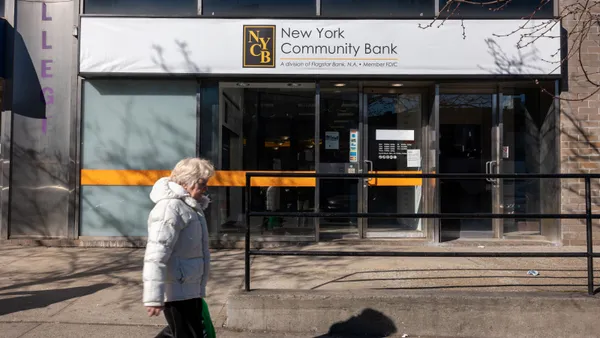Citizens Bank aims to achieve carbon neutrality by 2035 and is targeting $50 billion in sustainable finance by 2030, the bank said Tuesday.
The Providence, Rhode Island-based lender also pledged to engage with all of its clients in the oil and gas sectors by next year.
That doesn’t involve pulling financing that’s tied to high-emissions industries.
Rather, Citizens plans to encourage its commercial bankers to help clients develop tailored strategies to transition them to a slimmer carbon output — including steering them toward the bank’s recent sustainability-linked products, such as carbon offset deposit accounts.
“This announcement is about leaning into Citizens' role as a trusted adviser to look for ways that our clients can seize on the business opportunity related to the transition to a lower-carbon future," Rachel Greenberg, the bank's head of sustainability, told American Banker.
Efforts by the bank and its clients will be documented through “detailed disclosures and reporting” to ensure accountability, Beth Johnson, Citizens’ chief experience officer and head of ESG, said in a statement Tuesday.
The $50 billion figure includes affordable housing, support for small businesses and community development projects, the bank said. Within that, Citizens highlighted $5 billion in financing and facilitation for renewable energy, clean technologies and green buildings.
For itself, Citizens set Scope 1 and 2 emissions targets in 2021 that it aims to achieve through ongoing energy conservation investments and energy reduction initiatives. The bank wants to incorporate high-quality offsets and renewable energy credits to winnow the remaining Scope 1 and 2 emissions, it said.
Citizens is hardly the only large bank to make a wide-ranging carbon-reduction pledge in recent years. PNC in 2021, laid out a five-year, $20 billion environmental finance goal, then bolstered its pledge to $30 billion in January.
Goldman Sachs in 2019 detailed a 10-year, $750 billion “climate transition” commitment. A year later, the bank signaled it had put $156 billion into the effort.
JPMorgan Chase in 2021 pledged $2.5 trillion by 2030 to address climate change and advance sustainable development. Citi, meanwhile, pledged $500 billion to green goals in the same timeline. Bank of America, for its part, pledged $1 trillion to transition to a low-carbon future.
Citizens and its clients both stand to benefit from Tuesday’s pledge, Donald McCree, the bank’s head of commercial banking, told Bloomberg.
“It’s not only resulting in robust conversations,” McCree said. “It’s actually resulting in early-stage business opportunities for us.”















